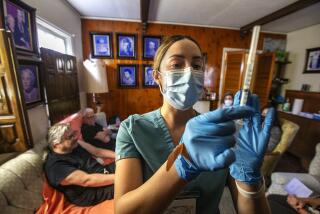L.A. County expects H1N1 flu vaccine this week
- Share via
Los Angeles public health officials say they expect to receive the first shipments of H1N1 flu vaccine this week.
Local clinics and doctor’s offices will receive small shipments of the FluMist nasal spray vaccine as soon as Wednesday, according to a statement released Friday from the Los Angeles County Department of Public Health.
“While the FluMist nasal spray vaccine may not be appropriate for everyone, we do encourage those who can receive this form of the vaccine to get it,” said Jonathan E. Fielding, the county’s director of public health.
“We especially encourage eligible school-aged children to receive the FluMist H1N1 vaccine. We had expected to see an increase in flu cases once the school year started, and those predictions have come true. Most cases of the pandemic H1N1 flu continue to present mild to moderate symptoms, but some individuals have had serious complications.”
Larger shipments of the vaccine -- in both the nasal spray and the traditional injectable form -- are expected to arrive this month, according to the department’s statement.
Residents eligible for the vaccine are encouraged to contact their doctor. Those eligible include people ages 2 to 24, healthcare and emergency medical workers and those who live with or care for infants under 6 months old. More information about flu prevention and eligibility for the H1N1 vaccine is at https://www.public health.lacounty.gov.
FluMist is not approved for pregnant women, those with chronic health conditions, weakened immune systems or a history of asthma.
This month, public health officials plan to begin providing the H1N1 vaccine to the uninsured and those who do not have a regular healthcare provider. Private clinics, pharmacies and other providers offering the H1N1 vaccine or the seasonal flu vaccine are listed at https://www.findaflushot .com.
“It is vital that residents of Los Angeles County do everything they can to protect their health and the health of their loved ones and community. This is best done through getting vaccinated against the flu and practicing good, basic hygiene,” Fielding said.
“This includes washing your hands often; covering your nose and mouth with a tissue or your elbow when you cough or sneeze; avoiding touching your mouth, nose and eyes; and staying home if you are sick or keeping your child home if he or she is sick.”
--
molly.hennessy-fiske@latimes.com
More to Read
Sign up for Essential California
The most important California stories and recommendations in your inbox every morning.
You may occasionally receive promotional content from the Los Angeles Times.














